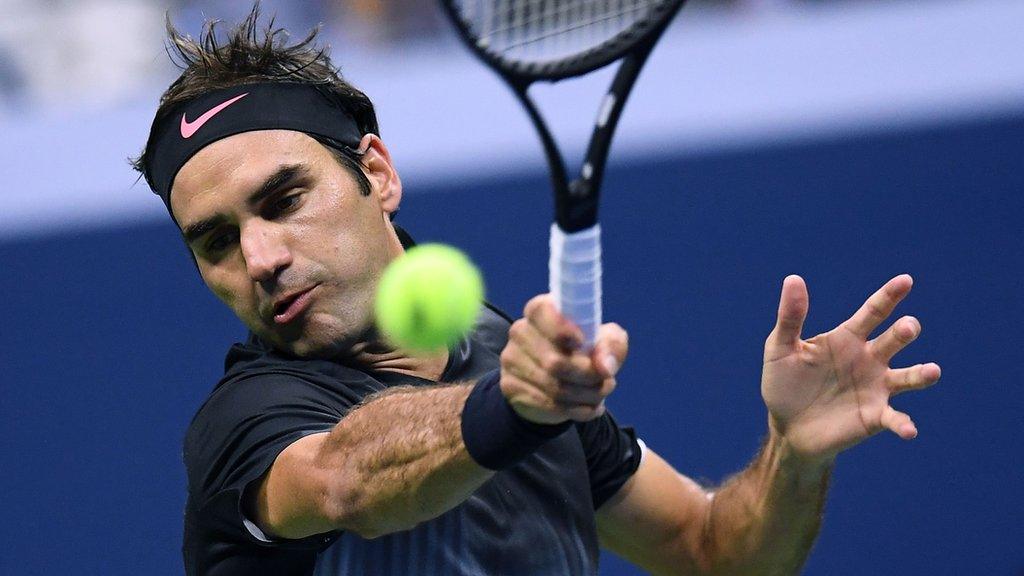Frances Tiafoe: The janitor's son who became an Australian Open hope
- Published
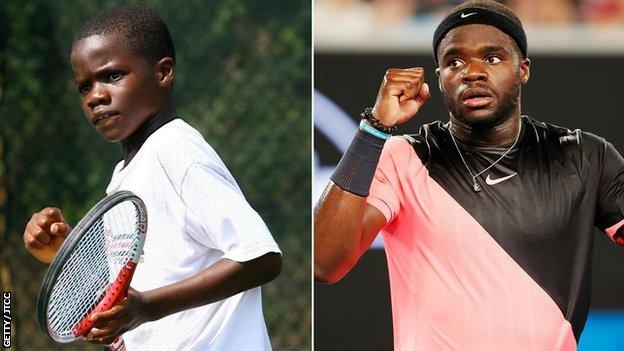
Frances Tiafoe (left) aged nine at the tennis club where he grew up, and at last year's Australian Open (right)
Australian Open 2019 |
|---|
Venue: Melbourne Park Dates: 14-27 January |
Coverage: Daily live commentaries on the BBC Sport website, listen to Tennis Breakfast daily from 07:00 GMT on BBC Radio 5 live sports extra and watch highlights on BBC TV and online. |
A version of this feature was originally published on 26 May 2018.
Frances Tiafoe is speaking from a bedroom in a five-star hotel in Geneva.
It is a stark contrast to where the American spent many of his boyhood nights, sleeping on the floor of a spare office in Maryland alongside his father and twin brother.
But a young Tiafoe - now 21, 39th in the world, and preparing for an Australian Open quarter-final against second seed Rafael Nadal - felt fortunate bedding down in that three-metre-by-four back room, even before he knew it was the key to his future life.
Tiafoe is an outsider for the Australian Open, but his story - and that of his family - is of greater odds overcome and slim chances seized.
It begins, two years before he was born, with his mother Alphina.
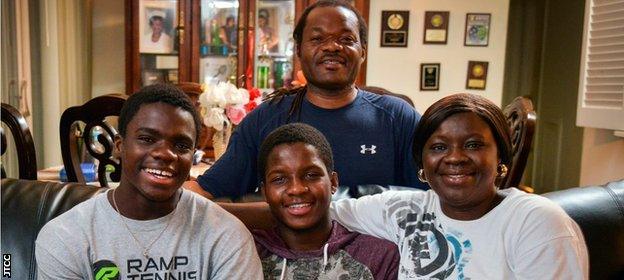
Frances Tiafoe, front left, with his twin brother Franklin, mother Alphina and father Frances Sr
Back in 1996, she was one of the fortunate few from the global millions to enter the United States' green card lottery.
The scheme - formally known as the diversity visa program, external - randomly allocates 55,000 visas to applicants from countries with low immigration rates to the United States.
With civil war deepening in her native Sierra Leone, Alphina tried her luck and was handed a route to a new life in the USA.
Three years later and with family finances stretched, Tiafoe's father Frances Sr joined a construction crew working on the Junior Tennis Champions Centre (JTCC) - an expansive, expensive multi-court facility near Washington DC.
With Tiafoe and twin brother Franklin just a year old, Frances Sr worked furiously to impress and, from the 50 or so builders on the job, was rewarded with a role as the centre's maintenance man when it was complete.
Even with those two long shots coming in though, the family's existence was still precarious.
As Alphina lived with relatives in a one-bedroom flat and worked night shifts as a nurse, Frances Sr quietly turned his long hours at the JTCC into 24-hour residence, taking his two sons with him.
Without the proper paperwork in place to use the office as living quarters, the club's management kept the situation on the down-low.
A strange living arrangement came with a strange fringe benefit though - all-you-can-eat top-quality tennis tuition for the inquisitive.
Toddlers Frances and Franklin would wander the grounds, watching, listening, absorbing and, when there was a spare moment or court, attempting to hit.
"My first real memory was my dad taking me and my twin brother to the club and holding our hand while we hit a ball against a backboard," Tiafoe told BBC Sport.
"As we got older, we would go school and tap the ball against the wall and when there was a court open, we would hop on."
Tiafoe's obvious aptitude, and his father's popularity around the club, gained him and Franklin free places among the JTCC's gifted youngsters.
As an eight-year-old, it still, at times, felt as if he had been dealt a losing hand.
"I was complaining about being made fun of for the clothes I was wearing," he said. "I had a lot of Pokemon Pikachu t-shirts on court and hand-me-downs from other kids.
"I was getting hot and said to my pops, 'why are we always walking around in no-name brand socks with holes in my shoes?'"
That was when Frances Sr rolled back the sliding doors to show what life could have been like.
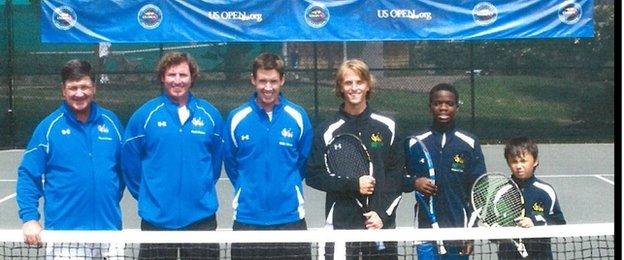
A 12-year-old Tiafoe, second from right, with JTCC staff and pupils including current Tour professional Denis Kudla, third from right
He told Alphina to take the boys with her when she attended a wedding in Freetown, Sierra Leone's capital.
"That definitely put life into a completely different perspective - the poverty was pretty bad," Tiafoe remembered.
"We realised that we ain't rich or living the high life, but we are definitely still blessed. We got food on the table every night, parents who love us, a TV, all the accessories we need. It ain't terrible, you know what I saying?
"I was definitely not running my mouth after that - I was about the happiest kid in the world.
"It humbled me and made me serious. It came into my head pretty quick to use tennis as a way to help, not only myself, but our family because they have sacrificed so much."
If Tiafoe's background inspired him, it also had the power to do the same for others. As a 14-year-old, he was the subject of a 1,000-word profile in the New York Times., external
When he was 16, the Washington Post followed suit. , external
As his story spread, sponsors signed up, agents circled and what was a disadvantage, in part at least, paid back as an advantage.
"My academy did a great job of getting my story out there for people to hear about me, get interested and wanted to fund me," explained Tiafoe.
"I had some sponsors who helped me with travel money because they knew my parents couldn't.
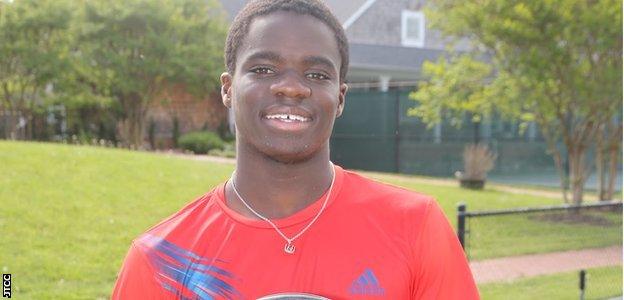
By the time he was 15, Tiafoe had long since left Pokemon t-shirts behind with racquet and sportswear deals in place
"I used it to my advantage and now here I am."
Here, via a prestigious junior wins and Challenger Tour success, is a run of form that saw him beat Juan Martin del Potro, Tomas Berdych, Pablo Carreno Busta and Kyle Edmund in the early part of 2018 and claim his first tour title with a win at Delray Beach.
And here is an Australian Open meeting with 17-time Grand Slam champion Nadal with a semi-final at stake.
And here is also a place in the midst of a generation of American players reflective of the political and social divisions back home.
Last year in Estoril, Tiafoe saved three match points to beat Tennys Sandgren, who was asked to defend his social media interest in white nationalist accounts during last year's Australian Open.
American number one John Isner used his post-match interview after beating Tiafoe at the 2016 US Open to describe Colin Kaepernick as "pathetic", external for refusing to stand for the national anthem in protest at the treatment of black people in the United States.
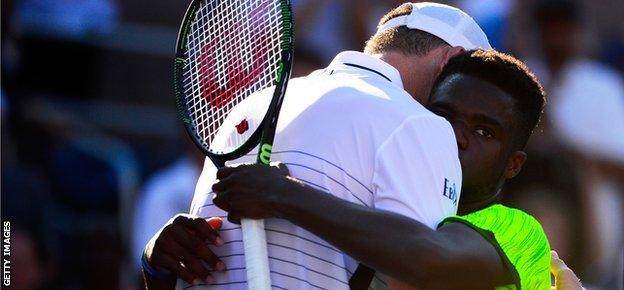
John Isner and Tiafoe meet at the net after their first-round match at the 2016 US Open
Serena Williams, who donated $100,000 to Kaepernick's charity in January, presumably thinks differently. Former American number one James Blake, wrongly arrested while standing outside a hotel in 2015, certainly does. , external
Tiafoe is not about to join the conversation, believing actions speak louder than words.
"I am not going to tell you that I know about politics because I don't," he said. "There are some guys who do, but that is not me. I try to stay out of it and stay in my lane.
"I try to treat everyone with love and respect. If you do that, you get the same back, if not more. It never got so left that I felt that I shouldn't be here."
It is love and belonging that have fuelled Tiafoe's current streak.
After losing four of his first five Tour matches in 2018, he returned to the JTCC - and credits a week on the College Park courts where he grew up for turning around his year, and possibly career.
"You can't forget your roots," he said. "It was just about remembering why I started tennis in the first place and being among people who will love you no matter what, whether you are on top on the bottom."
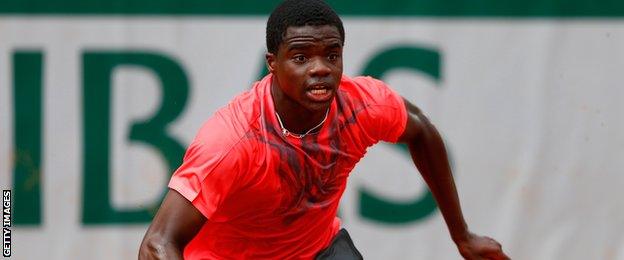
A 17-year-old Tiafoe in action at the 2015 French Open. Clay is his favourite surface after training and playing on green clay in the States
- Published21 May 2018
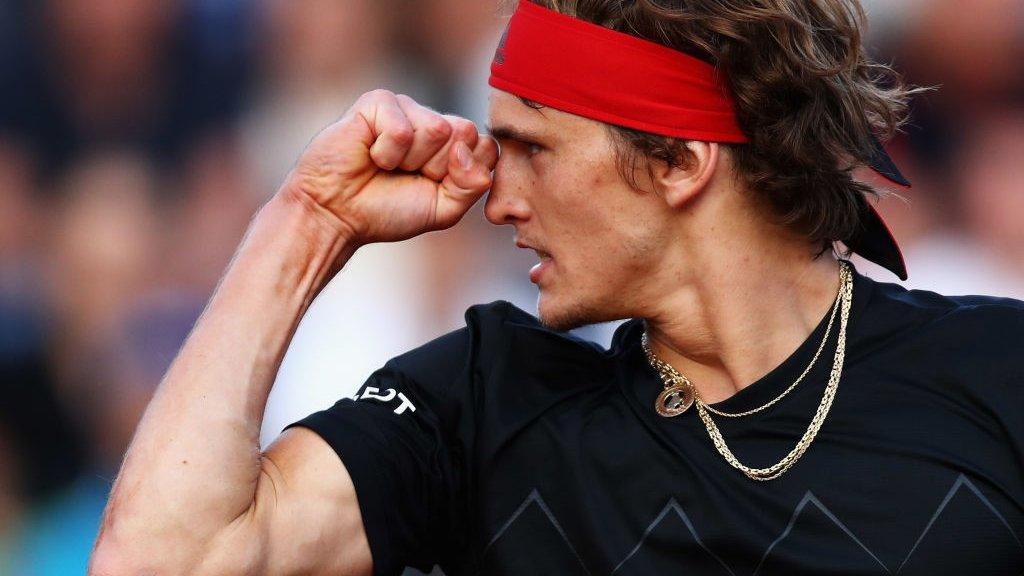
- Published30 August 2017
